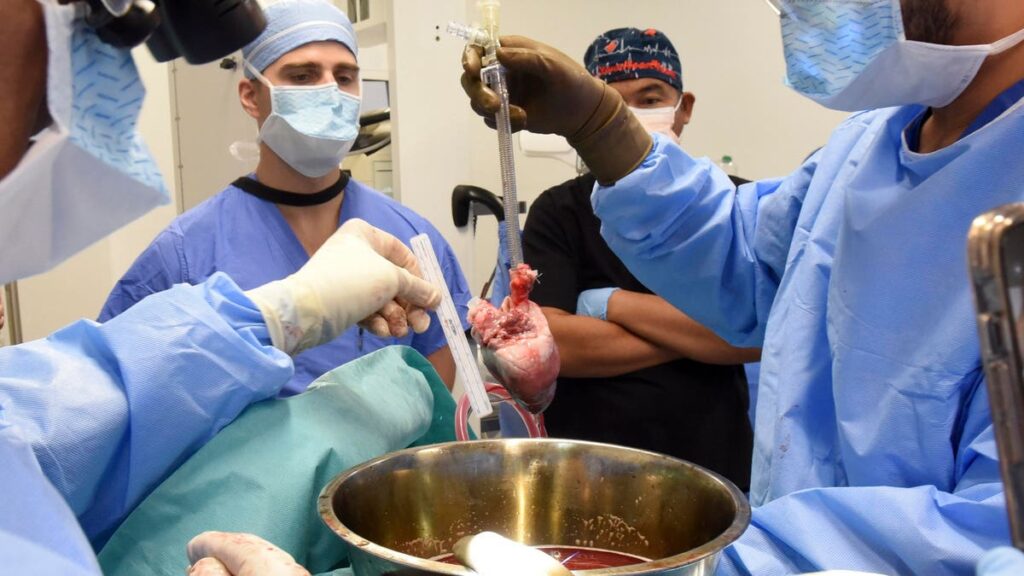Topline
Surgeons with the University of Maryland Medical Center were able to successfully transplant a pig’s heart into 58-year-old Lawrence Faucette on Wednesday, who was facing death with end-stage heart disease, the doctors announced Friday—marking just the second time this procedure, which doctors hope leads to a breakthrough in saving the lives of terminal heart disease patients, has been performed.
In this photo provided by the University of Maryland School of Medicine, surgeons prepare for a pig … [+]
Key Facts
Two days after the surgery, called a xenotransplantation, doctors said that Faucette is able to breathe on his own, his new heart is functioning properly without any assistance from supportive devices and he is able to communicate with his loved ones.
The pig heart was genetically modified to adapt to a human body and Faucette is being given an experimental antibody therapy as well as conventional anti-rejection drugs that are designed to suppress his immune response and get his body to accept this foreign organ, the doctors said.
Doctors said the procedure was the only viable option for Faucette, who was facing near-certain death from heart failure as he was deemed ineligible for a traditional transplant with a human heart due to pre-existing peripheral vascular disease and complications he had with internal bleeding.
Faucette reportedly told doctors before the surgery that the experimental procedure was his “only real hope left” and said that the surgery team has “been incredible, but nobody knows from this point forward. At least now I have hope, and I have a chance.”
Bartley Griffith, the surgeon who transplanted the heart into Faucette, said the team is “incredibly grateful to Mr. Faucette for his bravery” and said the procedure will help advance understanding of the field.
Key Background
In January 2022, the same Maryland University team was able to transplant a pig heart into David Bennett, who was also facing near-certain death. Bennett initially survived the surgery, but died two months later. Still, the doctors called it a partial victory in that it gave him more time alive with his loved ones, even if it was only months.
What To Watch For
How Faucette’s health progresses. The doctors said the next few weeks will be crucial in determining how Faucette’s body is able to tolerate the transplanted pig organ. Concerns include whether his immune system rejects the foreign pig organ or whether he suffers a porcine, or pig-borne, infection—though doctors noted that prior to the surgery, the donor pig was regularly screened for several porcine viruses, parasites and bacteria.
Crucial Quote
“We have no expectations other than hoping for more time together. That could be as simple as sitting on the front porch and having coffee together,” Faucette’s wife, Ann Faucette, said in a statement.
News Peg
About 110,000 people in the U.S. are waiting for an organ transplant, according to the federal government’s organdonor.gov. More than 6,000 of those patients die each year because they are unable to receive one. The doctors hope that transplanting animal organs, which is called xenotransplantation, could save thousands of those lives. However, they note the procedure carries a unique set of risks. Just like with Faucette, doctors worry that xenotransplants could transmit an unknown pathogen from the animal to the recipient and that the non-human organs are more likely to trigger a fatal immune response as the body rejects it.
Tangent
The surgery was made possible from a regulatory standpoint by the Food and Drug Administration, which granted emergency approval for the surgery last Friday through its “compassionate use” program. The program is used to allow experimental medical products, in this case a genetically modified pig’s heart, to be used on patients with a serious or life-threatening condition when it is the only option available.
Further Reading
Man Gets New Heart From Genetically Modified Pig—A First For Medicine (Forbes)


